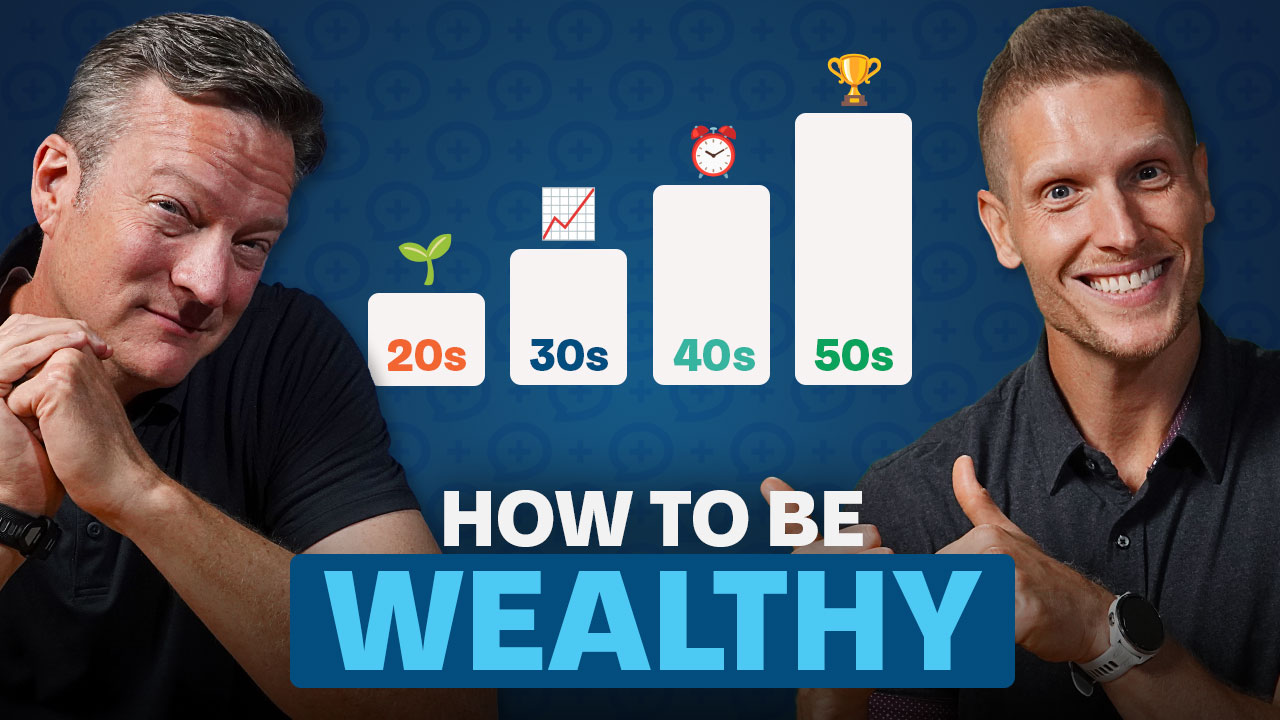He says, "So, this is great timing. I am currently getting ready to build a house. Is it alright to go with a higher monthly payment, higher than you recommend, in hopes of refinancing because we know interest rates are kind of hiked up right now? So, what do you guys think?"
Um, a lot of, you know, I had this conversation with a dear friend this morning, and right, this person, they've been trying to like get into a house, but the how's it the real estate market keeps kind of running from them, and interest rates have now worked against them. And I was like, "Well, look, if you're just trying to get on the right side of home ownership, a strategy is if you believe that in the future interest rates will come down. If you think the interest rates might normalize somewhere between four to five, five and a half percent, and that's what the normal is, but you just, for various reasons, need to be on the home ownership side of the equation, a strategy is, okay, I can go ahead and buy the house, and my monthly service might be higher than 25, but I know that if at some point in the future I'm able to refinance from seven percent or six and a half percent down to a four and a half or five and a half percent, then that brings the affordability factor down. That's a strategy that you could pursue."
Now, it makes me real nervous, Brian, because that's kind of like a little bit of Russian Roulette, a little bit of gamma, a little bit of thinking. Because, you know, the question I would have is, "Man, what if rates don't come down? And what are the other areas of your life like? What's the other Debt Service look like? Do you have student loans? Do you have credit cards? Do you have auto loans?" It just makes me real nervous. And okay, I'm gonna bend the rule right now, and once something changes, then I'll be where I'm supposed to be. There'll be, I'd have to have like a lot of safety nets on that, like, "Okay, my income's gonna go up, and I don't have any other debt service, and I feel highly confident that interest rates are going to fall where I can refi, and I'll be able to refi when that happens." Like, I just feel like I have to check all those boxes before I could tell Kyle, "Yeah, go that strategy."
Well, I mean, we share 25% of your gross income towards housing, and I get it, that seems a little tone-deaf. But the reason we have that rule, that sounds pretty rigid in these current times, is because we want to make sure that you're not, you know, house rich, life that's right. We actually want to make sure that you can still fund your savings and investment goals, but also still have enough, you know, jingle in your pockets to go out there and go on vacation and do other fun stuff.
So, here's what I would do if you're trying to get a little more analytical, but also understand that it's weird to give binary answers on something that has a lot of different moving parts. The first thing is that career and income, if you, um, because I've had these conversations and other components, like I had an attorney friend who went right after she graduated from law school, she was not funding her Roth IRA. And I was like, "You realize you should be funding a Roth because you're going to be making more money than it allows you to fund that." And you know, this is before we had all the backdoor conversions and so forth, but I was trying to tell her, "This is a window of time that you had to seize this opportunity." I was like, "You need to kind of plan ahead." So, I think if you're the type of person, like my example, this attorney, where your income will come out at the associate level, but within three to five years, your income likely will have doubled. You ought to at least put a bookmark into this, gives me some flexibility to think about where my career is going versus where this house and the affordability of it now versus what it will be in three years.
The other part, you mentioned interest rates, and this is something you could do as a fun exercise. We know that a huge part of affordability right now is the interest rates on mortgages. Crossing seven percent, which is something we haven't seen like in, I think, 40, you know, it's been a long time. So there's definitely a direct correlation to how high the interest rates are to the affordability. Go run the calculation of what your payment would be if mortgage rates went down to five percent instead of running a seven percent mortgage. Run maybe a four and a half or five percent mortgage rate. See if that gets you closer to that 25 threshold. And if it does, that might give you some peace to be like, "Okay, well, there might be an opportunity to get closer to the goal here when interest rates come down." Because I do think they will come down. I don't know if that's 12 months in the future. I don't know if that's 18 months in the future. But my reasoning on why I think they will come down is, I don't think our government can afford to keep rates this high. I mean, as you see the carry cost of the national debt as it approaches a trillion dollars a year, you quickly realize, man, this is something that, yeah, they're probably not going to want to sustain that for too long. But they're fighting inflation, so this is what it is.
And then the third thing, and Beau mentioned this, is other debt. I mean, because it's easy for somebody who came out of college with zero debt, zero credit card debt, to say, "Hey, since I have no other debt pulling on me besides this housing decision, I think I can probably go a little bit beyond the 25." But if you're somebody who's got, you know, 20% of your income going to your student loan debt, you have car payments, you have some credit card and consumer debt, that you do not need to be taking some jumps and flexibility on that 25 because you might be getting squeezed out on your total debt percentage. So pay attention to the other debt because that will impede your ability to save and invest for the future. And that's the key part I want to make sure that you don't make a decision today that incremental decision because you think that house is the most important thing, impeding your ability to actually have the great big beautiful tomorrow because that's how finances work. You stack up little tiny incremental decisions, but they have huge impacts. I mean, these things balloon out when you get 10, 15, 20 years in the future. So you want to be very mindful. That's why we talk about it 88 times over and all the other things.
Go check out our
Wealth Multiplier at
moneyguy.com/resources so you can make sure you have a good understanding not only of what this house will do for you, but what you should be focusing on with your financial resources and Kyle, I'd encourage you to go download our
eight questions to answer before you buy real estate. This way, you can make sure you're answering all the questions correctly. Visit
moneyguy.com/resources to get that deliverable as well.
For more information, check out all of our
free resources here.













